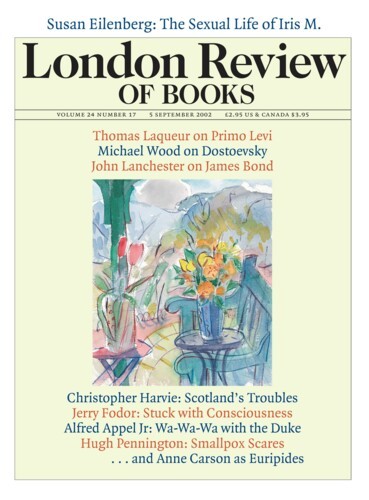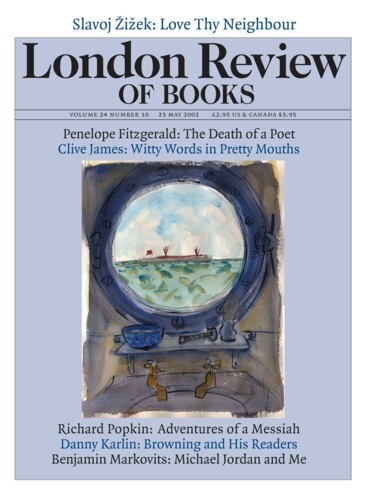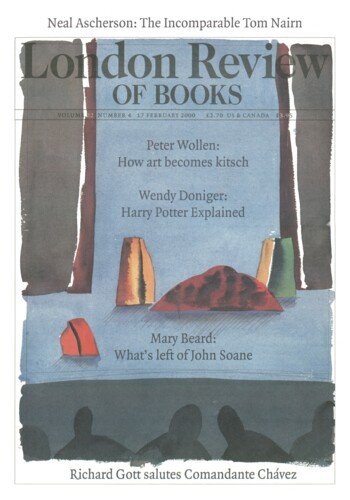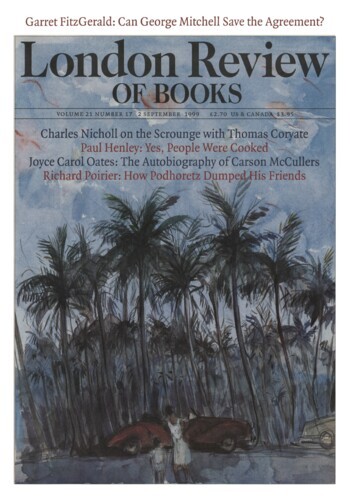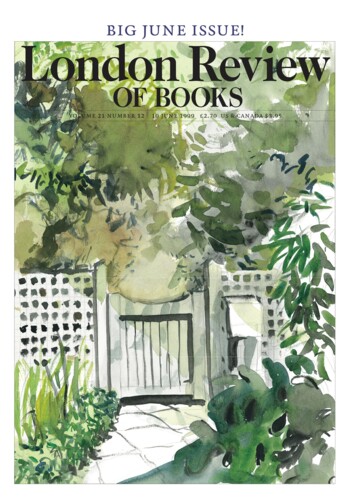John Bayley
John Bayley, who died in 2015, was the first holder of the Warton chair in English literature at Oxford. He wrote 153 pieces for the LRB, some of which were collected in The Power to Delight: A Lifetime in Literature. His other books include The Romantic Survival, The Characters of Love and studies of Shakespeare, Hardy, Pushkin and Tolstoy.
Witty Scalpel
23 May 2002
Gide’s Cuttlefish
John Bayley, 17 February 2000
The best thing on Stendhal in English is an essay by Lytton Strachey in which he remarks the way the author denovelises the novel while skilfully retaining all its traditional apparatus. Stendhal’s imagination is a kind of parody of Scott’s: his sensibility is itself its own journal and his own memoir. Reviewing Stendhal’s last book, The Charterhouse of Parma, when it appeared in 1839, Balzac noted admiringly that the novel ‘often contained a whole book in a single page’. But that book is not one which Stendhal would have bothered to write, and no audience would have been concerned to read it.‘
Strange Things: the letters of Indian soldiers
John Bayley, 2 September 1999
From the recollections of the Roman centurion who tells his story to the children in Kipling’s Puck of Pook’s Hill, we learn that a Libyan cohort, the Thirds, were stationed as part of the garrison on Hadrian’s Wall, and that when crisis comes and the ships of the Winged Hats attack out of the north, these troops were faithful and resolute: they ‘stood up in their padded cuirasses and did not whimper’. They must have felt the cold, poor devils, as did the two Indian Army corps, more than a hundred thousand men, stationed in Northern France during the damp and bitter winters of 1915 and 1916. But those troops, too, stood to it and did their duty.‘
Hottentot in Jackboots: The Cockney School
John Bayley, 10 June 1999
The Politicisation of poetry can sometimes bring back to vivid life the poet’s original outlook and preconceptions: it can also misunderstand them. A poem that comes off, and takes off, does so in terms of its own language, irrespective of ideological impulses and overtones. Time, as Auden observed,
Pieces about John Bayley in the LRB
Puffed Wheat: How serious is John Bayley?
James Wood, 20 October 2005
In their very different ways, the three most prominent Oxford professors of English since the war have all been populist pretenders. John Carey, scourge of Modernist ‘intellectuals’...
Never further than Dinner or Tea: Iris Murdoch
Alexander Nehamas, 4 March 1999
The first thing Alzheimer’s disease took away from Iris Murdoch was her luminous powers. At a conference in Israel in 1994, she was unable to answer her audience’s questions. In 1995,...
Distant Sheep
Penelope Fitzgerald, 21 July 1994
John Bayley’s new novel is largely about those who are had on, or taken in, and this may well include his readers, who need to keep their wits about them. To begin with, he conjures up a...
A Poetry of Opposites
C.H. Sisson, 9 July 1992
Whatever may now be the state of the market for A Shropshire Lad, the poetry of A.E. Housman has certainly been among the most read of the 20th century. Or in the 20th century, for the earlier...
Dan Jacobson on the story of stories
Dan Jacobson, 19 May 1988
In a recent issue of Index on Censorship, Vaclav Havel, the dissident Czech playwright and essayist who has spent long periods in prison, tells the following tale: A friend of mine who is...
The Things about Bayley
Nicholas Spice, 7 May 1987
There is a certain kind of knowledge – perhaps the most important – that cannot be explicitly taught or diligently learnt. For example, a tribe of Indians on the river Xingu lives on...
Foreigners
Denis Donoghue, 21 June 1984
One of Anthony Thwaite’s poems, ‘Tell it slant’, swerves from Emily Dickinson’s line ‘Tell all the Truth but tell it slant’ to settle upon an aesthetic...
Theatre-proof
Anne Barton, 2 July 1981
Twenty-one years ago, in The Characters of Love, John Bayley suggested that ‘there is a sense in which the highest compliment we can pay to Shakespeare is to discuss his great plays as if...
Read anywhere with the London Review of Books app, available now from the App Store for Apple devices, Google Play for Android devices and Amazon for your Kindle Fire.
Sign up to our newsletter
For highlights from the latest issue, our archive and the blog, as well as news, events and exclusive promotions.
